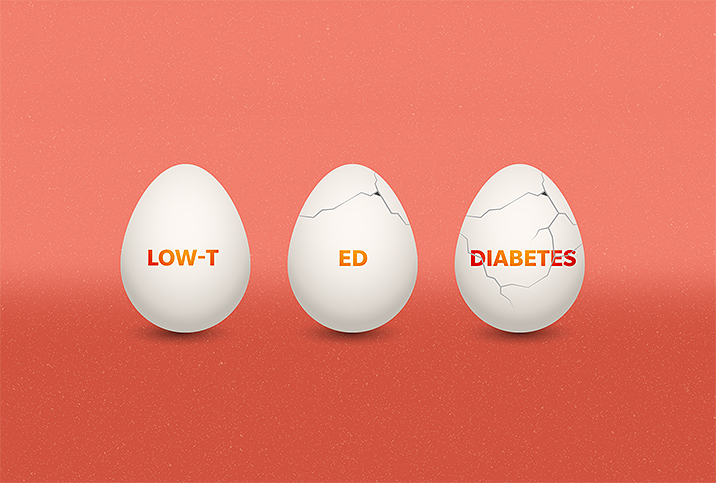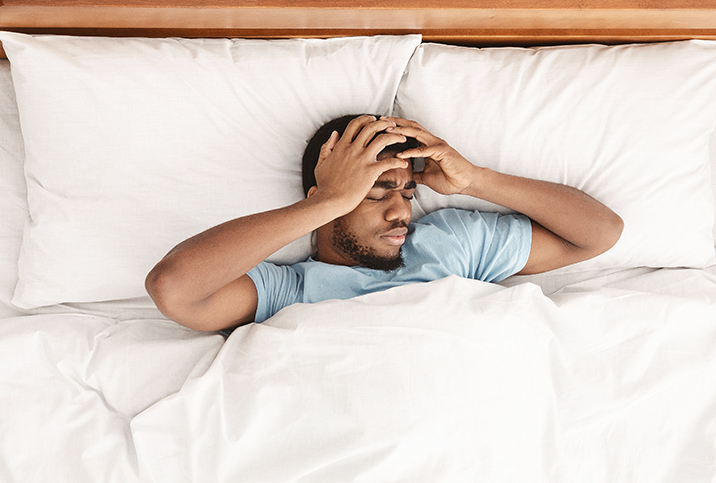New Study Suggests Several Risk Factors for Low-T

Key Points
- Low levels of testosterone can have various adverse effects, including depression, erectile dysfunction (ED) and difficulty maintaining a healthy body composition.
- Testosterone deficiency can lead to multiple health issues.
- A new meta-analysis identified several lifestyle and health factors associated with low-T, including a history of diabetes or cancer, being a former smoker or having a long-term relationship.
One of the more important facts about having low testosterone levels is that there can be various causes. Most commonly, age or underlying health conditions are to blame, but lifestyle factors can play a part, too.
A 2023 meta-analysis pinpoints several factors that could adversely influence testosterone levels, from a history of cancer or diabetes to being married or in a long-term relationship or having once been a cigarette smoker.
What did the researchers find?
Researchers from the University of Western Australia looked at data from 11 cohort studies involving 25,149 men aged 17 to 99 in the Annals of Internal Medicine study published in August 2023.
The studies used mass spectrometry to evaluate participants' levels of total testosterone, dihydrotestosterone, luteinizing hormone, sex hormone-binding globulin (SGBG) and estradiol.
Testosterone levels remained relatively consistent until age 70, suggested the data. After that, testosterone levels fell while levels of luteinizing hormone—the chemical that stimulates the testes to make testosterone—increased.
They also found that, overall, married men, those with cardiovascular disease or hypertension (high blood pressure) and those on cholesterol-reducing medications had lower levels of testosterone.
So, too, did guys with a history of diabetes, cancer, smoking or who were overweight or obese. A sedentary or minimally active lifestyle—defined as 75 minutes maximum of vigorous exercise per week—was associated with low-T as well.
The researchers also found correlations between SHBG levels, age and body mass index (BMI). Older men generally had more SHBG, while those with higher BMIs had less. Sex hormone-binding globulin controls how much testosterone and estrogen the body can use.
"The findings suggest men with the specified risk factors may benefit from additional screening if they're experiencing symptoms of testosterone deficiency," said Rahul Mehan, M.D., chief medical officer at Geviti and founder of East Valley Urology Center in Mesa, Arizona.
"They also highlight the importance of addressing the causes of low testosterone rather than relying on simple low-T fixes," said Scott D. Miller, M.D., urologist and medical director at Wellstar Urology in Atlanta.
Testosterone replacement therapy (TRT) can be a valuable tool for many men, particularly when low testosterone (or male hypogonadism) is contributing to another medical condition.
However, if testosterone deficiency stems from an underlying issue, it's often necessary to tackle that first.
Why is testosterone deficiency more common in older men?
In the published meta-analysis, researchers reported testosterone levels significantly dropped at age 70, but not before.
"However, most evidence suggests levels of testosterone decline by about one percent per year beginning around age 40," said Michael Werner, M.D., the medical director and founder of Maze Sexual & Reproductive Health, in New York City and Purchase, New York.
"The average age of menopause for a woman is 51. Is the average age of andropause for man 70? I don't think the answer is that simple. Men are not programmed to go through andropause at a set age," Werner said.
Experts aren't sure why low-T is more common in older men, but underlying health conditions may be partly to blame.
"Obesity, diabetes and metabolic syndrome, for instance, can all affect hormone levels and are more prevalent with age," he added.
"Additionally, receptors on the testosterone-producing Leydig cells in the testicles become progressively insensitive to luteinizing hormone, which is secreted by the pituitary gland," Miller said.
Luteinizing hormone (LH) prompts the testicles to produce testosterone, which is necessary for sperm production.
"In essence, the testicles start to ignore the instructions given by the pituitary gland, similar to how a child might ignore repetitive guidance from a parent," he continued.
Recommended
- 9 Potential Causes of Low Testosterone: Genetics, lifestyle choices, illnesses, treatments, age and more can all contribute to low-T.
- Problems Caused by Low-T—Including 7 That May Surprise You: Low testosterone is linked to sleep, cognitive function, physical performance and other issues.
- Know the Symptoms of Low Testosterone: Low-T is common in many middle-aged men and can stem from a number of causes, including aging.
How can underlying health conditions affect levels of testosterone?
Roughly two percent of all men and eight percent of men aged 50 to 79 are estimated to have low-T, according to Cleveland Clinic. Some low-T issues affect the testicles, while others impact the hypothalamus or pituitary gland.
Having low levels of testosterone could also raise the risk of certain health conditions.
Look at the four most common health conditions associated with low-T:
1. Can low testosterone cause high blood pressure and cardiovascular disease?
"Anything that inhibits or alters blood flow—including hypertension or heart disease—can damage the delicate testicular cells and the structures that serve them," Miller said. "What's good for the heart is good for every bodily function."
Multiple studies have found a link between testosterone deficiency and an increased risk of heart disease, particularly in older men.
Some experts believe testosterone could have a protective effect on the heart, though the evidence to date is inconclusive, according to a 2021 review published in CJC Open.
Additionally, low-T can make it more challenging to maintain a lean body mass, which in turn may contribute to overweight or obesity and that excess body fat may lead to cardiovascular disease and high blood pressure.
2. Can low-T contribute towards diabetes?
Men with type 2 diabetes are more likely to have low levels of testosterone than those without, according to Cleveland Clinic. One study found 25 percent of men with type 2 diabetes had low-T as compared to 13 percent of those who didn't have diabetes.
"The relationship between low-T and type 2 diabetes is a "chicken and egg" situation," Werner said. "Low-T could lead to type 2 diabetes by contributing to insulin resistance. Likewise, type 2 diabetes may affect levels of testosterone."
Type 2 diabetes occurs when the body becomes insulin resistant, causing blood sugar to rise.
"Low-T can independently cause insulin resistance," Miller said. "But the causation is bidirectional."
Testosterone likely plays a role in regulating blood sugar levels and testosterone therapy can be beneficial for men with type 2 diabetes, according to a 2020 study published in the journal Diabetes, Obesity and Metabolism.
"When blood sugar levels are high, the pituitary gland struggles to produce normal amounts of LH, which can diminish testosterone levels," Mehan said. "Also, low-T, diabetes and insulin resistance can all lead to a rise in body fat, which can further increase insulin resistance and blood sugar levels."
3. Does low testosterone cause weight gain?
In addition to being a risk factor for heart disease, hypertension, type 2 diabetes and certain cancers, having a higher-than-average body fat percentage can independently disrupt hormonal balances in the body.
Roughly 30 percent of men who were overweight had low-T as compared to six percent of those with average BMIs, according to a 2016 report.
2014 research published in the Asian Journal of Andrology also indicates men with above-average BMIs tend to have lower levels of LH and SHBG due to obesity's effect on the hypothalamic-pituitary-testicular (HPT) axis, including insulin resistance.
"In addition, fat cells contain aromatase, which converts testosterone to estrogen," Werner said. "As a result, men with excess body fat tend to have higher levels of estrogen and less testosterone."
Often, weight loss helps to bring levels of testosterone back to normal, according to 2021 research.
4. Is low-T linked to getting cancer?
"The relationship between cancer and testosterone, in general, isn't entirely clear, and more research is needed," Miller said. "It may simply be that low testosterone is a surrogate marker for other health conditions that are also risk factors for cancer."
"Also, testicular cancer, specifically, can negatively affect testosterone production, and treatment for metastatic prostate cancer often involves reducing testosterone levels," Werner said.
"Notably, there's no evidence that testosterone therapy increases prostate cancer risk," he added.
How can cholesterol-reducing medications affect testosterone?
"The relationship between cholesterol-reducing medications and testosterone levels could be explained by the relationship between high cholesterol and other conditions, such as obesity and heart disease," Miller said.
"However, these medications can also directly influence testosterone levels since cholesterol is a precursor of testosterone."
Although these medications lowered testosterone levels, the drop wasn't enough to cause a deficiency, indicated a 2022 review published in The Journal of Sex Medicine.
Why were levels of testosterone lower in former smokers?
"Smoking can directly damage cells involved in testosterone production and can also contribute to other conditions known to reduce testosterone levels," Werner said.
"There are research papers that showed nicotine can slightly increase testosterone levels. However, other papers show smokers have a faster age-related decline in testosterone compared to nonsmokers," Mehan said.
"The reality is that smoking causes deleterious effects on the entire body. Smokers have higher rates of hypertension, diabetes and insulin insufficiency. These all lead to lower levels of testosterone in the long run."
Additionally, some research suggests smoking may increase levels of SHGB, diminishing the levels of available testosterone in the body, he added.
Why do married men have lower levels of testosterone?
Erectile dysfunction (ED) can substantially affect men's relationships and is among the most frequently cited conditions caused by testosterone deficiency. However, this and other research suggest a man's relationship could also affect his levels of testosterone.
Single men and those in new relationships had higher levels of testosterone than those in long-term pairings, indicated a 2015 study.
Men in committed relationships have about 20 percent lower testosterone than their single counterparts, suggested a 2003 study.
The reasons for this aren't clear. Some researchers have theorized that it may be because testosterone increases mate-seeking behavior or that lower testosterone facilitates emotional intimacy and support for people in relationships, according to a 2016 report.
Investigators at the University of Western Australia posit that men with families may live with more stress.
"However, most studies suggest married men—but not women—are less stressed than singles," Werner said.
"Alternatively, married guys may be less inclined to exercise and diet, and those with kids may get less sleep. All of that may lead to conditions associated with low-T," Mehan said.
What other lifestyle factors might influence testosterone levels?
"In general, the better men treat their bodies, the better their health—and testosterone levels—will be overall," Mehan said.
"For instance, regular exercise can help improve cardiovascular health and blood sugar regulation and aid in weight loss. It could also help to maintain lean muscle mass and prevent or improve existing conditions, such as type 2 diabetes, hypertension and metabolic syndrome."
It should also be noted that research indicates exercise can alleviate stress and improve sleep. There's a bidirectional link between low-T and sleep, where lack of sleep can decrease testosterone levels and low-T can inhibit sleep.
The same goes for stress.
"Stress leads to higher levels of cortisol being released, and cortisol is a testosterone killer," Mehan said.
"Both testosterone and cortisol—the stress hormone—originate from the complex conversion of cholesterol," Miller said. "When the body senses an overproduction of cortisol, it suppresses the entire supply chain."
In addition, because testosterone deficiency is associated with increased stress, depression and anxiety, that can create a vicious cycle.
The bottom line
There are many low-T myths, including the notion that it always causes symptoms such as depression, fatigue, difficulty losing fat or gaining muscle and ED.
However, some men with below-average levels of testosterone don't experience any issues at all, while some with relatively normal testosterone levels do.
See your healthcare provider if you think you or someone you love may have low-T. Your doctor will determine if your testosterone is low, help you determine if you have another condition that's responsible and recommend an appropriate treatment plan.


















